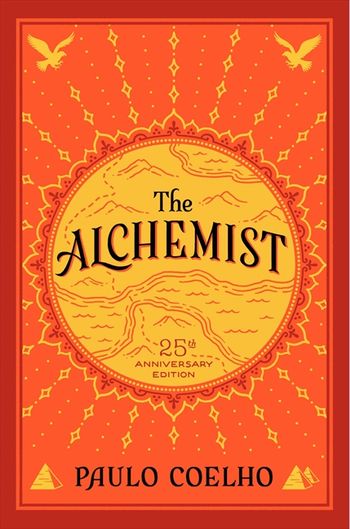Who wouldn’t want to live out their dream? As a new quarter begins, we all hope to achieve success (even as we enroll in 22 units). Whether you’re ready to brave the storm or you’d prefer some encouragement first, “The Alchemist” by Paulo Coelho (pronounced co-AIL-you) offers an elegantly crafted fable on how to “realize your destiny,” as long as you can overlook its prominent flaws.
As an international bestseller with editions in 67 languages, the novel has become a cultural phenomenon, with vocal fans like Bill Clinton and Will Smith, and has even wound up on high school curriculums. The novel chronicles the story of Santiago, a young Andalusian shepherd who, inspired by a recurring dream of his destined “Personal Legend,” decides to leave his life of wandering in order to travel to the Egyptian pyramids. Though he faces many obstacles, including losing all his money (three times!) and accidentally getting involved in tribal warfare, he draws on his courage and determination to overcome them all. From his journey, he finds treasure in his new experiences as well as a budding romance. He returns from Egypt to find literal gold and jewels at the roots of an Andalusian tree, because “wherever your heart is, there you will find your treasure” and “you’ve got to find the treasure, so that everything you have learned along the way can make sense.”
This book shines most through its lovely prose and miniature fables embedded in the larger allegory, such as jewels in a crown. Many lines throughout the novel sound like quotes you could frame and hang on your wall, and I wrote several of them down on my first read. For example, one parable related life to walking while holding a teaspoon with two drops of oil. As the “old man” in the novel says, “The secret of happiness is to see all the marvels of the world, and never to forget the drops of oil on the spoon.”
Yet Coelho has difficulty in maintaining a balanced tone. The novel’s overpowering cheeriness grates after a while, as in this line: “Most people see the world as a threatening place, and, because they do, the world turns out, indeed, to be a threatening place.” Viewing the world as a “threatening place” is usually for good reason.
The author also sacrifices a lot of depth; none of the characters have personal struggles relatable beyond the surface-level. Granted, this could be part of the fable-like story structure, but Santiago has no burden to carry that lasts for more than a few pages. He solves several of his problems through the intervention of an old king, magical rocks, a prophetic vision, an alchemist, a kindly monk and sheer luck. Even Fatima, his fiancée, pronounces that she is happy to be “one of the women who wait” for her lover to return as she used to “envy [such women] their happiness” in doing so–talk about unrealistic romantic expectations.
Nevertheless, the simplified character development seems like a conscious choice for the reader’s ‘self-insert’ into the story. For example, the author only mentions the protagonist’s name once in the very first line, “The boy’s name was Santiago,” and afterwards refers to him with common nouns like “the boy” and with personal pronouns so that the protagonist becomes a placeholder for the reader.
In an attempt to universalize Santiago’s journey, Coelho uses the plot as a vehicle for the “law of attraction” (a New Thought belief that by having positive thoughts, you will attract more positive things into your life, which has since been dubbed a pseudoscience). In effect, the novel feels like a motivational quote that’s been extended for about 200 pages. Another issue is its overindulgence in self-reliance, to the point that the world of “The Alchemist” feels rather bleak for those without the capacity to leave their families, sell off their sheep and journey to the Pyramids for a “Personal Legend.”
Then again, this novel is not necessarily meant to grapple with complex questions or lofty truths of human existence. It’s a straightforward allegory with a rich setting and meaningful symbolic elements. For some context, “The Alchemist” is one of those rare books that blends traditional genres, though some critics suggest it leans “more self-help than literature.” This book appears in search results with the Oprah-endorsed, self-help bestseller “The Secret” by Rhonda Byrnes, but it’s also listed next to classics like “Siddhartha,” which contributed to Herman Hesse winning a Nobel Prize. Though you can discuss whether certain classifications hold greater weight than others do, the novel ultimately fulfills its purpose by helping readers (and dare I say, achieves its “Personal Legend”).
There’s something comforting about a simple story with a simple message, especially if you’re on the brink of full-fledged adulthood and the future seems uncertain. The novel’s lasting power comes from how it taps into the human desire for control and reassures you to “follow your dreams,” promising that you’ll eventually succeed as long as you maintain courage through all your tests and trials. Though the book posits that you’ll face the occasional failure since life always interferes, it provides a warm safety blanket that you can wrap around yourself as you take your next step toward a goal.
Literary merit aside, “The Alchemist” has a place on my bookshelf because a little bit of encouragement does go a long way (and it was also on my high school curriculum, so I still have it). Since this novel has already reached so many people, myself included, then it’s accomplishing a remarkable deed in making its readers think more deeply about themselves and the world. And isn’t self-reflection part of the journey to success?
So if you’ve been waiting for an “omen” to get started on your “Personal Legend,” the “universe [has conspired] in helping you achieve it” through (re)introducing this book to you. (Just remember to refashion this overly optimistic story for your own needs.) Good luck!
Contact Shana Hadi at shanaeh ‘at’ stanford.edu.
